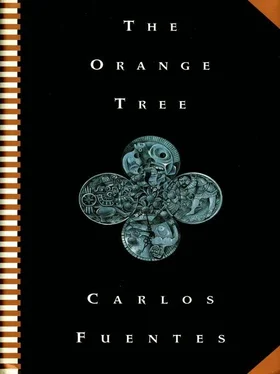You failed.
In the same way you duplicated the city, you duplicated yourself.
You lived five years more, but you were never the poet you wanted to be nor the warrior you were. Did something diminish you? Did you lose forever the unity of your body and your spirit before the two Numantias? In one of them, a desolate space, an invisible time, nothing happened. On the other hand, within the city, there took place sacrifice, madness, and death. Ultimately, the second space was useful only to be crossed by the mute, savage survivors of Numantia. The procession of conquered defenders, transformed into animals. It must be terrible to see an abstention of yours converted into degradation and death. Thus, Cornelius Scipio Aemilianus, your presence before Numantia was in fact an absence. You never fought. You did nothing. And when Numantia fell, your saw the atrocious presence of what was an absence.
You quite properly used yourself up, conqueror of Carthage and Numantia. Quite properly, you never again lived in peace.
* * *
I wonder, as I remember the heroic enterprise of Numantia, what the perimeter I invented for the city without Numantia, its double facing it, might have been. A barnyard, a meadow, a farm — all or any of them peaceful and ordinary? Why do we choose one place and give it a name in history? I withdraw, conquered by my triumph. I can’t bear its weight. I look for new avenues for my energy. In the campaigns against Carthage and Numantia, I met many simple soldiers who held rather precarious title to the land they occupied. They weren’t large landowners; but the radical agrarian reform promoted by my cousins, the turbulent Gracchi, stripped bare both the owners of latifundia and small settlers without title to their land. I became their defender. I made lots of enemies, more invisible than the ghost of Numantia. But my external activity, once again, did not calm my own internal disorder.
I spend hours at a time sitting on my throne facing the orange tree in my courtyard in Rome. It’s about to bear fruit, and I want to be the first to see it flower. I shall make the orange tree my interlocutor during these afternoon hours. I’ve given up shaving; I can only think if I caress my neck, which is covered with bristles. The problem of duality obsesses me. I invent a theory of geometric duality. If it is true that any two lines define a point at their intersection and that any two points determine a line, it follows that when all points touch an ellipse they exhaust themselves. Their unity concentrates and immediately requires the protection of a double to shield and prolong that unity. From this it follows that all unity, once attained, requires a duality in order to prolong itself, to maintain itself.
I think I’ve resolved the problem of Numantia, and, as the afternoon declines and I feel cold, I wrap myself in my black Spanish cape, the one I used facing the besieged city. I go into my bedroom. I shut the curtains, but no sooner do I lie down in my bed than the noise of mice distracts me. How do I fight them? That is not my problem. Let me not be distracted or annoyed by mice hunts. What I wonder is if everything in the universe has an exact double. It’s possible. But now I know that even if that’s true, it is also dangerous. Twins staring each other in the eye would annihilate themselves without raising a finger. The unleashing of two identical powers would destroy both. That is the basic law of physics. In Numantia, I gave the inevitable doubles, generated by the geometric encounter between my forces and those of Numantia, the opportunity to see each other for only a moment in history. The cleverness of my strategy consisted in making the first Numantia believe that when she looked outside her walls she would see a second Numantia. The first Numantia was ready to lose her life in the clash with the second Numantia. But since that second city did not exist, she waited in vain and killed herself. My strategy consisted in transforming Numantia into her own enemy.
I tell myself that my time was that of a slow haste. There is, perhaps, no better rule for a field commander. I acted in the instant when my strength, by embodying Numantia’s double, destroyed her but not me. I found the exact point on the earth where a force, disguised as Nothingness, destroyed its opposing force, which was the real double of an absence traced by my military genius. Thus the two propositions combined, geometry and physics, in a purely bellicose action. The geometric intersection demanded a double to maintain unity. But the gravity of physics rejects the presence of two identical forces staring each other in the eye. I fooled geometry, which is a mental thing, and physics, which is a material affair. I proved that in any circumstance in human life NOTHINGNESS IS WHAT IS POSSIBLE.
I was quite properly received in triumph on my return. But then there was light. Now the afternoon reaches my bedroom only with difficulty. Glory, glory to the conqueror of Carthage and Numantia. Glory twice over. I hear the noise. Is it the mice? Is it the footsteps of those who received me in triumph? I hear footsteps. I caress my neck. I remember that as a boy I argued with Polybius and the other friends of the Scipionic circle about the nature of immortality. How curious: that debate arose because the Gracchi spoke about equality. Then we asked each other: Can there be equality if there is no immortality? Does only death make us equal? “No,” argued Polybius, “immortality itself can be selective. Only select spirits ascend to the heavens and know God. Does that idea disgust you? Don’t you think at least that fame confers immortality? Do you accept fame but also demand equality? Serve your country well, Scipio Aemilianus. Use language well, the gift of the gods to men. You were born to honor Rome, to guarantee her power through arms and her moral strength through language.”
Equality, immortality. I hear the footsteps. The curtain is violently pulled open. I caress the bristles on my neck. A single, long bristle, cold and hard, enters through my neck, and I think of Spain as I die.
* * *
YOU are dreamed. Dead, you have reached the celestial mansion, and there you see yourself again at the age of eighteen, when Polybius arrived with slavery and books at the house of your adoptive family and began to make you worthy of it. You dream of yourself when you were young. You want that to be your image for immortality: an eighteen-year-old boy who is going to attempt to be the perfect combination of statesman and philosopher. God receives you and praises you. He says that your name, first a mere inheritance, is going to be yours by your own right. You will burn and raze Carthage. You will besiege and conquer Numantia.
“Two destructions,” you say to God. “Is that to be my monument: death?”
God doesn’t answer you, but He does offer you the renewed vision of Numantia. What really took place in the besieged city? Numantia was isolated. Almost no one survived. You again see the survivors leave. Not only did they look like animals, they were animals. They never spoke again. Who knows what they did with their women and children. They no longer want to remember anything. From then on, they communicated only with vultures and wild beasts. They were animals. They never spoke again.
You hear these words that speak to you of the end of language and you quickly return to life. Your face shines, you know at the age of eighteen, young, what you did not know old at the age of fifty-seven, when you died. You ask yourself what shall be the monument to your glory, Cornelius Scipio Aemilianus. Carthage? Numantia? Two names buried in fire and hunger? Two monuments to death? You see once again the ruin of Numantia: storms whip it, the sun burns it, the winter freezes it. Time, the climate, add to its ruin; the elements destroy as they pass, ruining the ruin. And yet, what is it that shines in the heart of Numantia? You can barely make it out. A clay pot, a bronze mask, a stone bull, plant, tree, orange tree … Orange tree? Another identical to yours in the center of the city you destroyed? Is it an illusion, have you imagined your own orange tree in the ash-covered center of Numantia?
Читать дальше












